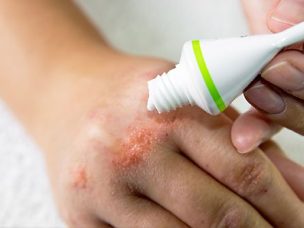Dermatitis
Atopic Dermatitis and Infertility
The prevalence of infertility is greater among individuals with AD as compared to healthy individuals without AD. Infertility is the failure to achieve a clinical pregnancy after 12 months or more of unprotected sexual intercourse. A decline in fertility rates is a significant public health concern. Infertility affects approximately 10–15% of couples across the globe....
Atopic dermatitis and the risk of eating disorders
Individuals with AD are at relatively significant risk for the development of concomitant ED, hence, it is important to remain vigilant of the cutaneous manifestations of ED Atopic dermatitis (AD) is a prevalent inflammatory skin disorder that impairs the quality of life of both the patient and the caregiver to a significant extent. This inflammatory...
Reframing Racial and Ethnic Atopic Dermatitis Disparities
Atopic dermatitis is the most prevalent skin disease. Up to 25 percent of children and 8 percent of adults have a current or past atopic dermatitis diagnosis. Atopic dermatitis negatively affects the quality of life and disrupts sleep at night due to itch. In addition to asthma and allergies, atopic dermatitis comorbidities can lead to:...
FDA Approves Rinvoq for Treatment of Atopic Dermatitis
The U.S. Food and Drug Administration approved Rinvoq (upadacitinib) for the treatment of moderate-to-severe atopic dermatitis in patients aged 12 years and older, the manufacturer announced Friday. The approval is indicated for patients with atopic dermatitis that did not respond to previous treatment and is not well controlled with other medications or when the use...
Dr. Andrew F. Alexis Talks Eczema and Ethnic Skin With MDNewsline
MDNewsline recently interviewed international skin of color expert and dermatologist Dr. Andrew F. Alexis about treating eczema in patients of color. Dr. Alexis is a member of the Skin of Color Society (SOCS) and we thank the SOCS for providing this interview opportunity. MDNewsline: According to the National Eczema Association, 20.2% of African American children in the...
Dr. Michelle Henry Talks Eczema in Patients of Color
Dr. Michelle Henry is a Harvard trained Mohs surgeon and a board-certified dermatologist. She is currently a Clinical Instructor of Dermatology at Weill Cornell Medical College where she practices Mohs micrographic, reconstructive, and cosmetic surgery. Dr. Henry attended medical school at Baylor College of Medicine in Houston, Texas and completed her residency in dermatology at...
Dr. Meena Singh On Treating Eczema In Patients of Color
Dr. Meena Singh is a Harvard Medical School graduate, board-certified dermatologist and dermatologic surgeon in Kansas City who specializes in hair transplant and ethnic skin. She is the Medical Director for KMC Hair Center whose multiple locations include Shawnee, Leawood, and Kansas City. We recently sat down with Dr. Singh to discuss eczema in darker...
Continued Usage of Dupilumab Shows Atopic Dermatitis Treatment Results
Severe atopic dermatitis (AD) produces painful, itchy and unsightly patches that disrupt sleep and have been linked to increased risk of depression. Now researchers have analyzed findings from a randomized follow-up trial in adults from two previous studies (SOLO 1 and SOLO 2) and found that maintenance monotherapy with dupilumab (Dupixent, Regeneron) at 300 mg...
Mothers with Depression May Cause Atopic Dermatitis in Their Children
Atopic dermatitis (AD), a chronic, inflammatory skin disease that causes itchy, painful patches on patients has been linked to many mental health disorders, such as depression, anxiety, and suicidal tendencies. A study conducted by Jonathan Silverberg, MD, PhD, MPH, associate professor of dermatology at the George Washington University School of Medicine and Health Sciences, took...
More Medical News














